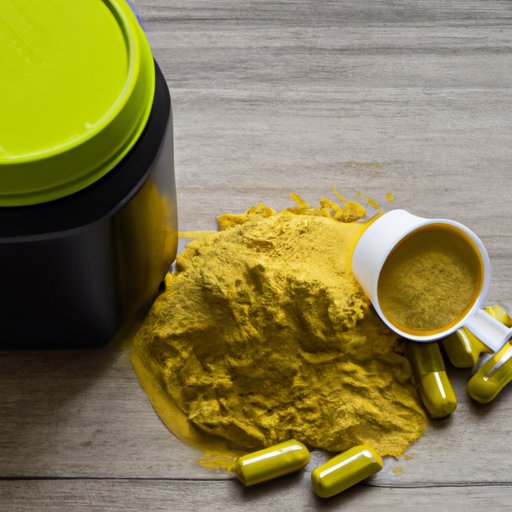Introduction
Pre-workout supplements are a popular choice for athletes and gym-goers looking to get an extra boost before their workout. But how healthy are they? In this article, we’ll explore the pros and cons of pre-workout supplements, investigate what the science says about them, and provide advice on how to choose the right supplement for you.
A Nutritionist’s Guide to Pre-Workout Supplements
Before delving into the science behind pre-workout supplements, let’s take a look at what they are and what they do. Pre-workout supplements typically contain ingredients such as caffeine, B vitamins, creatine, and other amino acids. These ingredients are meant to improve performance by increasing energy levels, boosting alertness, and improving focus.
While pre-workout supplements can be beneficial in certain situations, it’s important to understand the potential risks associated with them. Before taking any type of supplement, it’s important to talk to your doctor or nutritionist to make sure it’s safe for you. Here are some things to consider when evaluating pre-workout supplements.
What to Look for in a Pre-Workout Supplement
When choosing a pre-workout supplement, it’s important to read the label carefully. Look for products that contain natural ingredients and don’t have added sugar or artificial flavors. Also, make sure to check the dosage instructions to make sure you’re taking the right amount.
Benefits of Pre-Workout Supplements
Pre-workout supplements can offer a number of benefits, including increased energy, improved alertness, and enhanced focus. They can also help reduce fatigue during long workouts, allowing you to push yourself further than you would otherwise. Additionally, some pre-workout supplements contain ingredients that can help build muscle and support recovery.
Potential Risks of Pre-Workout Supplements
Although pre-workout supplements can be beneficial, there are also potential risks associated with them. Some of the most common side effects include nausea, headaches, and jitters. In extreme cases, pre-workout supplements can even cause heart palpitations and high blood pressure. It’s important to talk to your doctor before taking any type of supplement, especially if you have a pre-existing medical condition.
What the Science Says About Pre-Workout Supplements
Now that we’ve explored the potential benefits and risks of pre-workout supplements, let’s take a look at what the science says about them. While research is still ongoing, there are a few key points to keep in mind when considering pre-workout supplements.
Examining Popular Ingredients in Pre-Workout Supplements
Caffeine is one of the most popular ingredients in pre-workout supplements, and it’s been shown to improve physical performance and reduce fatigue. Creatine is another common ingredient, and it has been shown to increase muscle mass and strength. Beta-alanine is another common ingredient, and it has been shown to improve endurance and reduce fatigue.
Evaluating the Claims of Pre-Workout Supplement Manufacturers
When evaluating the claims of pre-workout supplement manufacturers, it’s important to remember that not all supplements are created equal. Some products may contain ingredients that are not supported by scientific evidence. Additionally, some manufacturers may make exaggerated claims about the effects of their products. Always do your research and consult with a professional before taking any type of supplement.
How to Choose the Right Pre-Workout Supplement for You
With so many pre-workout supplements on the market, it can be difficult to know which one is right for you. Here are a few tips to help you make an informed decision.
Consider Your Personal Goals
The first step in choosing a pre-workout supplement is to consider your personal goals. Are you looking for something to help you lose weight? Build muscle? Increase your endurance? Once you’ve identified your goals, you can start looking for a supplement that contains ingredients that will help you achieve those goals.
Consult with a Professional
It’s always a good idea to consult with a professional before taking any type of supplement. A qualified nutritionist or doctor can help you evaluate your goals and recommend the best pre-workout supplement for you.
Are Pre-Workout Supplements Really Necessary?
Now that we’ve explored the potential benefits and risks of pre-workout supplements, let’s take a look at whether or not they’re really necessary. For some people, pre-workout supplements can be beneficial, but for others, they may not be necessary.
Weighing the Benefits and Risks
Before deciding whether or not to take a pre-workout supplement, it’s important to weigh the potential benefits and risks. Make sure to talk to your doctor or nutritionist before taking any type of supplement, and make sure to read the label carefully before taking any product.
Exploring Natural Alternatives
If you decide that pre-workout supplements aren’t right for you, there are plenty of natural alternatives that can help you reach your fitness goals. Eating a balanced diet and getting regular exercise are two of the best ways to stay fit and healthy.
The Benefits of Natural Alternatives to Pre-Workout Supplements
Natural alternatives to pre-workout supplements can be just as effective, if not more so, than traditional supplements. Here are a few natural alternatives to consider.
Herbal Remedies
Herbal remedies, such as ginseng and guarana, can help boost energy levels and improve focus. However, it’s important to talk to your doctor before taking any type of herbal remedy.
Diet and Exercise
Eating a balanced diet and getting regular exercise are two of the best ways to stay fit and healthy. Eating plenty of fruits and vegetables, whole grains, and lean proteins can help boost energy levels and improve overall health.
Conclusion
Pre-workout supplements can be beneficial in certain situations, but it’s important to understand the potential risks associated with them. Talk to your doctor or nutritionist before taking any type of supplement, and make sure to read the label carefully. Additionally, there are plenty of natural alternatives that can help you reach your fitness goals, such as herbal remedies and a balanced diet and exercise.
(Note: Is this article not meeting your expectations? Do you have knowledge or insights to share? Unlock new opportunities and expand your reach by joining our authors team. Click Registration to join us and share your expertise with our readers.)
